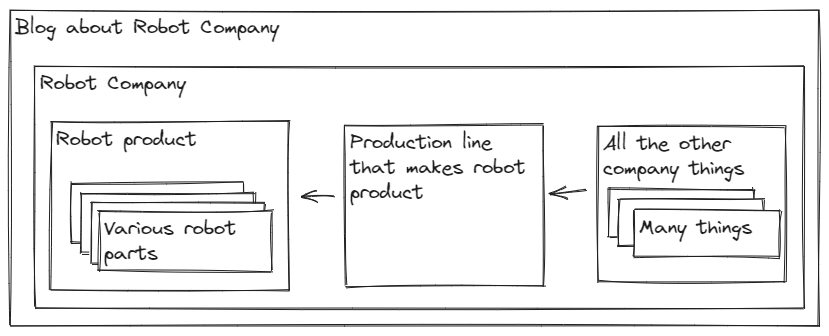The scope of the blog

Post 2
The TLDR (for now) is:
As much as possible without getting pointless or personal.
not the company,
not the product.
Just what actually exists right now.
This is the kind of post you skip over and come back to later when you have questions.
Too wide a scope?
How much of this venture should this blog cover?
Just the tech, the manufacturing, the entire business?

I think it would be great to cover as much as possible. Not just the tech progress, but every aspect of getting a business started, down to basic decisions like: Why use one business tool over another for some particular task.
That means a big mix of topics. A big mix of:
- Go-to market and business models
- internal infrastructure, software tools etc,
- cool drawings as output from ideation
- deep tech dives into DFM electrical engineering
- And more...
And that right there, is the immediate smell of too-wide-a-scope.
When an idea "smells funny", the best action is to look for a working (or failing) example of the same thing, i.e., a good blog that's discussing "the whole thing" it takes to get a project off the ground. Not the fun-pretty-stuff.
Until I find something like that... here is the start of a crude SWOT analysis.
What is SWOT?
Allow me to expl.... nooope....I need to make an "out of scope" section.

Out of scope from the start
Things I thing should be here:
- Explaining things that are already sufficiently explained somewhere obvious
Like "what is a <business tool>" in order to have algorithms drag people onto your site. - Republishing the news
Plenty of better places to get the news than this blog.
https://www.roboticsbusinessreview.com/ has some good articles. - Vague Truisms
Unlike every food blog on the internet, there won't be any starting block of text that you automatically skip. You know, the one telling you how "pizza has become a favourite food in many families" in 6 different ways - Personal life
I can't find it now, but I once came across a dev blog (developer blog) that was >50% about the guy's gym routine. - Stretching to be relevant on the current world events in order to have quick wins on viral content, e.g., There is a disaster in <place> and here is how these robots would help, etc.
- Unnecessary explanation like this very paragraph that is only here because all the previous points had further detail.
- Opinions outside my field
- Advertising
Unless stated otherwise, no links or mentions are because someone paid for it.
Moving on...
The actual SWOT analysis
For now its not drawn up on a 4-box chart.
Community feedback
Here, I'm referring to the management of well-meaning suggestions.
(For "judgements", see further down)
Opportunity: it reduces the work needed to shape the ideas along the way. Having some support is going to be helpful.
Threat: It requires work to manage any sort of community. Some sort of strategy is needed for this, otherwise, it's a group of people who have time to sit and chat.
I recommend reading the Excalidraw blog in this case.(https://blog.excalidraw.com/reflections-on-excalidraw/)
It's not quite an example of dev blog driving a project, but the first post addresses the values of having a community during a project build and some of the management issuesyou need to be ready for.
Easy to replicate
Threat: It seems a bit like shooting yourself in the foot if you are openly discussing a go-to market strategy. Isn't that just going to generate a lot of extra competition? Didn't Peter Theil say famously, "Competition is for losers"?
Can't anyone just absorb a large quantity of information about the project and pitch it to a VC as their own work to jump ahead of the game?
Opportunity: I speculate that the industry will burn through a number of companies before it settles into working models. A lot of players will enter the robot industry in the next decade. Many are already looking a lot like “tech fodder companies” that are just going to get chewed up by being sloppy in their rush to success.
Despite all the AI hype right now, actual robots running around your home and office are going to be a regulator's nightmare. Furthermore, social change takes a long time. There is an interview with Musk somewhere about him being happy with EV competition because more companies being involved will accelerate the transition to sustainable transport. More later on how these things tie together.
The weakness - one might point out - is that it's similar to having the other player be able to read your thoughts in a chess game. However, I think in modern game theory, it's probably better that serious other players know what you are doing than both of you being surprised about stepping on each other's toes.
As such, a possible strength here is in being clear about your intended market. If you look like you are doing it well, it might mean the most creative of your competitors will look to make business elsewhere. That makes your competitors less creative in general.
A couple of other short notes:
A lack of others doing the same thing is probably a strong sign that one is heading in the wrong direction.
Finally, I speculate that the energy that goes into hiding the details is better spent getting better at what you are doing.
Demonstrations of competence.
And Demonstrations of willingness to grow in the right direction.
There are a lot of willing and competent engineers out there. Finding them can be very tricky.
A good engineer can imagine achieving: “whatever it is that I set my mind to”. But it's hard for others to see it and find it if you are not producing demonstrations of the work.
I think the willingness factor, is also somewhat underrated. I've just done a few rounds of recruiting new people at the studio. One perspective when looking at profiles is demonstrations of motivation in the relevant area of work. Not just skills that match. It's all well and good to say “I want to try something new”. But, any amount of demonstrated effort in the field makes a big difference. Even if it's just self-interested research, at least you know what you are getting yourself into. It's an extra cost for someone to find out if you like something or not.
The point is, that the blog puts down a public demonstration of interest in a direction and examples of growth and competence in that area.
As such the opportunity of doing something like this is that it can open doors.
The threat is that you look stupid and naive or have goals that are too high. I think the best way to mitigate that is to just be clear and say it. "These are very high goals, and it's going to be a lot of work".
Chris Hadfield says it all considerably better.
"Constantly be looking to become more competent. All you can really do is get ready for stuff. That’s what life is, getting ready for stuff. And, you can always continue to get a little more ready for things and then see what opportunity brings. And every skill you have lets you stand just a little bit higher." - Chris Hadfield
Time
Weakness: It takes a lot of time to minimize the saying of useless or stupid things. I already have a running private dev journal for the project. It's much easier. This is the 7th version of this post. The other 6 drafts are completely different. Putting things in writing is hard.
All this time is at the cost of development.
But, the strength is that it enforces better documentation and more thought-through decisions. Even if the work is not entirely peer-reviewed, it becomes peer-reviewable, and that increases the quality of what is being produced.
People's judgements
Threat: People are going to judge and criticize and that's also going to be very time-consuming.
Sabine Hossenfelder clearly puts a lot of time into her research. And still, there are dozens of response videos pointing out any tiny mistake. Perhaps that's how you know you've made it.
Opportunity: having a wide range of content might be a good way to build a bit of a judgment of trust.
Just look at all these nice references to intelligent and inspirational people. This Robot Company guy surely is going to be stand-up reliable, right?... right?...
The right audience
This is just some last-minute completeness. This blog doesn't even have an audience yet...
Threat: it might simply be that being too broad loses everyone's attention and makes the entire exercise pointless. Too many posts in one area will likely shy people away, i.e., a loss of subscribers.
Opportunity: It might not be possible to hold people's attention these days anyway, so tracking a limited set of topics may no longer be that important. Are subscriptions even still a thing? Isn't it all algorithms now anyway? It could be that covering a lot of topics allows one to reach a wide audience, at least for a short part of their attention span. Then, whoever decides to stick around, will be more closely aligned with the broader interest of the entire project.
Threat: It could also be that a wide range of audiences will result in a lot of chiming in outside of people's areas of expertise or interests. But that could also be valuable. I don't know.
And finally,
And finally and specifically on the idea of blogging the entire process: Maybe I missed something!
Let me know and I'll add it as an edit.
Next post:



